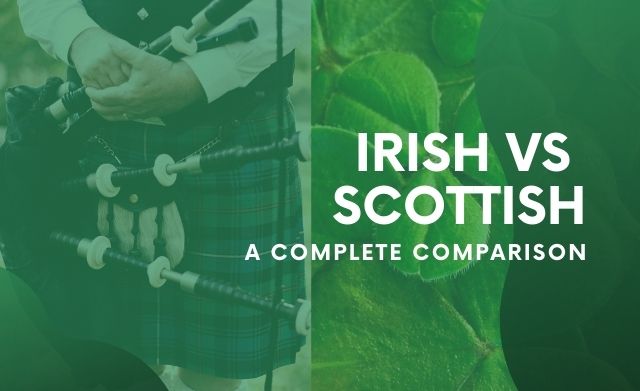Have you ever wondered if the Scottish and Irish are the same people? It’s a common question, fueled by the shared Celtic heritage, similar accents, and perhaps a bit of confusion about the British Isles. The answer, however, is more nuanced than a simple yes or no. While Scotland and Ireland share a fascinating history and cultural tapestry woven with Celtic threads, they are distinct nations with unique identities. Let’s delve into the nuances of their intertwined histories, languages, cultures, and national identities to understand the intricacies of the Scottish and Irish relationship.

Image: differpedia.com
Exploring this connection is not just academic curiosity. It helps us understand the complex tapestry of European history, the forces that shaped modern identities, and the enduring impact of cultural exchange. By delving into the differences and similarities between Scottish and Irish cultures, we gain a deeper appreciation for the rich diversity within the Celtic world and its enduring influence on the world today.
A Shared Celtic Heritage: The Foundation of Similarity
The first point of connection between Scotland and Ireland lies in their shared Celtic heritage. Both nations share roots in the ancient Celts, a group of Indo-European peoples who migrated to the British Isles from mainland Europe around the middle of the 1st millennium BC. This shared ancestry laid the groundwork for many cultural similarities that endure to this day.
Celtic Languages: Echoes of a Shared Past
One of the most tangible connections is the presence of Celtic languages in both nations. Gaelic, a language descended from Old Irish, is spoken in parts of Ireland and Scotland. While the two languages evolved separately, they share a linguistic family tree, making them mutually intelligible to a certain degree. This linguistic connection offers a direct link to the shared Celtic heritage and speaks to the enduring influence of this ancient culture.
Cultural Similarities: The Threads of Celtic Tradition
Beyond language, Scottish and Irish cultures share numerous similarities, often rooted in Celtic traditions. Both nations boast rich folklore, filled with tales of fairies, kelpies, and mythical creatures. Music plays a central role in both cultures, with traditional instruments like the harp and the bagpipes finding a place in both Scottish and Irish music. The strong emphasis on family, community, and storytelling forms a unifying element across Celtic cultures.

Image: gcn.ie
Distinct Histories: Forging Separate Identities
While the shared Celtic heritage provides a foundation, the divergent paths of Scotland and Ireland have played a crucial role in shaping their unique identities. Their distinct histories, marked by political and social upheavals, have carved their separate narratives in the tapestry of their identities.
The Influence of the Vikings: A Northern Twist in Scottish History
Scotland’s history was significantly influenced by the Vikings. Starting in the 8th century, Viking raiders and settlers made their presence felt in the country, leaving a lasting impact on its linguistic evolution and social structure. The influence of the Vikings is evident in the language, place names, and even the physical appearance of some Scots. This Viking influence added a distinct northern element to the Scottish identity, setting it apart from the Irish experience.
The Anglo-Norman Conquest: Shaping Irish Identity
In contrast, Irish history was heavily shaped by the Anglo-Norman invasion of the 12th century. The English monarchy asserted control over Ireland, establishing a system of rule that profoundly impacted Irish society. This Norman influence is evident in architecture, legal systems, and even the Irish aristocracy. The legacy of the Anglo-Norman invasion remains a complex and sensitive part of Irish history, contributing to a sense of resistance and separation from England.
National Identities: Defining What It Means to be Scottish or Irish
Ultimately, the distinct historical experiences of Scotland and Ireland have culminated in the formation of two distinct national identities. While they share some cultural similarities rooted in their Celtic past, their differences in language, history, and political experiences have left an indelible mark on their self-understanding as nations.
The Scottish Identity: Battling for Independence
Scottish national identity has historically been intertwined with the concept of independence. After centuries of union with England, Scotland embarked on a new chapter of self-determination in the 20th century. The Scottish Parliament, established in 1999, reflects the growing desire for a more autonomous Scotland within the UK. This pursuit of independence, fueled by a sense of distinct cultural identity and history, plays a significant role in defining what it means to be Scottish in the modern era. The Scottish identity is marked by a sense of pride in its heritage, coupled with a strong desire for self-determination.
The Irish Identity: A Story of Resilience
The Irish identity has been forged through centuries of struggle and resilience. Irish history is marked by a complex relationship with England, characterized by colonialism, resistance, and ultimately, independence. The Irish struggle for self-determination resulted in the establishment of the Irish Free State in 1922. This journey has shaped the Irish identity, characterized by a strong sense of national pride, a deep connection to the land, and a commitment to cultural preservation. The Irish identity is woven with themes of resilience, cultural pride, and a shared history of struggle that continues to shape the Irish people’s collective identity.
Are Scottish And Irish The Same
Conclusion: Beyond the Similarities
It is crucial to recognize that Scotland and Ireland are distinct nations with unique histories, cultures, and national identities, despite their shared Celtic heritage. While they share a fascinating common thread, their individual journeys and experiences have shaped their individual identities. Understanding these differences allows us to appreciate the richness and complexity of the Celtic world and its enduring influence on the tapestry of European history. Recognizing the separate journeys and identities of Scotland and Ireland fosters a deeper understanding and appreciation for the diversity and richness within their shared heritage.






